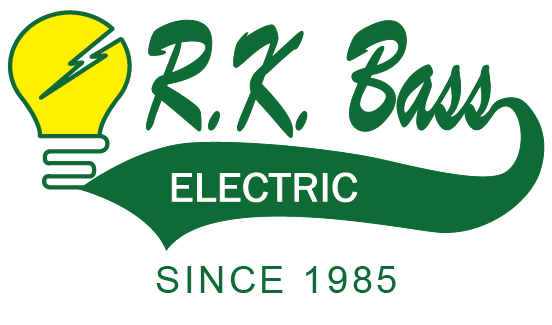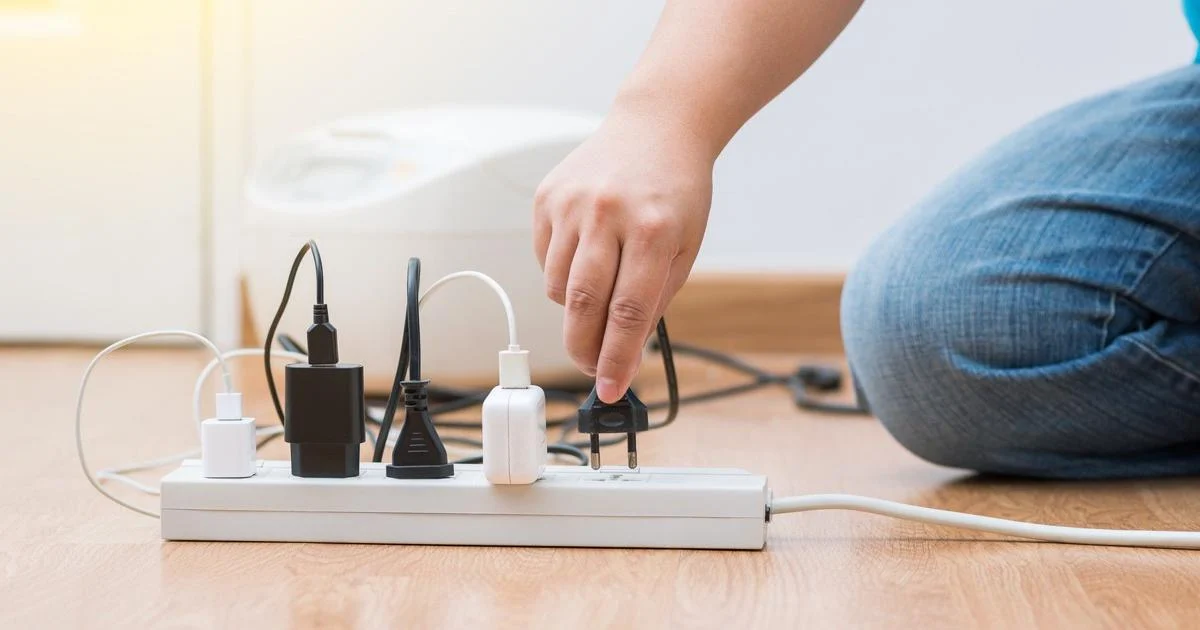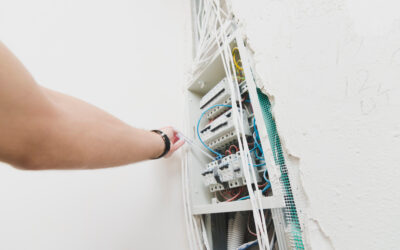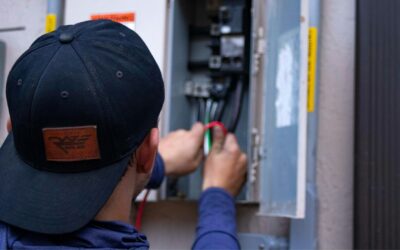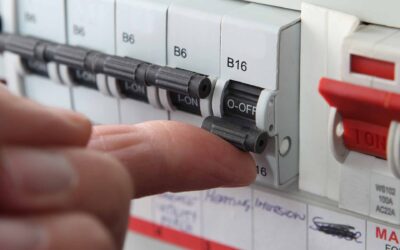Why Surge Protection Is a Must for Commercial Properties
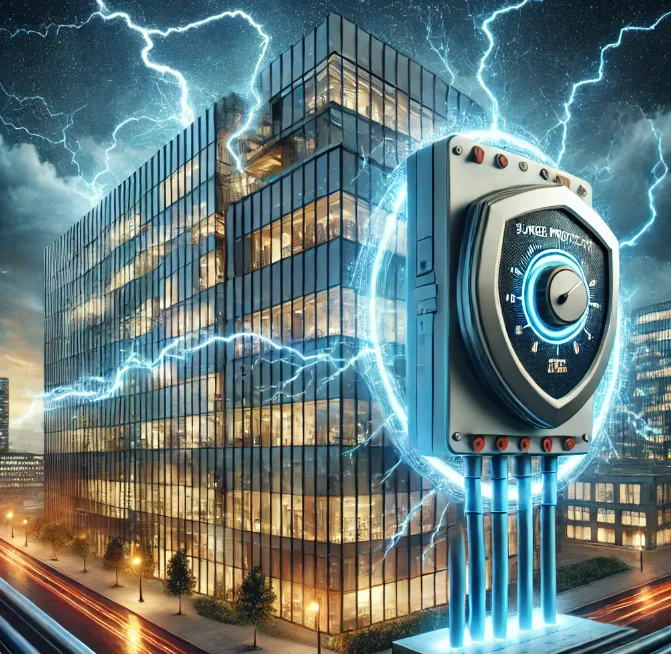
Have You Ever Thought About What a Power Surge Could Cost Your Business?
Imagine this scenario: You’re running a busy day at your commercial property when suddenly, a power surge hits. Your computers, servers, HVAC systems, and even the lights stop functioning. Equipment is damaged, work grinds to a halt, and the repair costs pile up. It’s a business owner’s nightmare, but it’s preventable!
Power surges are more common than many realize, and they pose serious risks to commercial properties. In this detailed guide, we’ll explain what power surges are, why they occur, and how surge protection can save your business from unnecessary losses.
Understanding Power Surges: What Are They?
A power surge also known as voltage surge refers to a brief boost in voltage level that occurs around any circuit. The default voltage is always reasonably constant for most systems, and even though this is usually acceptable, voltage transients causing a nominal voltage to increase even for Nano seconds could cause damage or destruction of electrical equipment.
Common Causes of Power Surges
1. Lightning Strikes
Lightening can occur near your building or even on the power lines and send enormous amounts of electricity into your system.
2. Power Outages and Restorations
At the end of any electricity disruption there are always surges when power is again switched on due to an increased voltage.
3. Overloaded Circuits
You also get shocks when you plug many devices at once because you over power your electrical system and cause surges.
4. Equipment Malfunctions
There are internal power surges from old or damaged appliances and machines.
5. Utility Grid Issues
Perils, for instance, transformer related issues including those that affect power distribution can lead to surges.
Why Are Commercial Properties at Greater Risk?
Commercial properties often house expensive and sensitive electrical equipment, such as:
- Computers and servers
- Point-of-sale (POS) systems
- HVAC systems
- Industrial machinery
- Lighting systems
The complexity of commercial electrical systems and the large number of connected equipment turn businesses more sensitive to power surge effects.
The Shocking Risks Associated with Lacking Surge Protection
Equipment Damage: Even a very small spike can knock out sensitive electronics all together.
Operational Downtime: Time lost can equal thousands of dollars in revenue lost per hour.
Safety Risks: It is for this development that electrical fires result from power surges that cause a device to overheat.
Data Loss: Unprotected servers and computers risk losing critical business data.
How Surge Protection Works
Surge protectors are devices designed to regulate excess voltage and redirect it safely away from your equipment. Here’s how they operate:
1. Detection: Surge protectors identify when voltage levels exceed safe limits.
2. Redirection: Excess energy is diverted to a grounding wire or dissipated to prevent it from reaching your equipment.
3. Absorption: High-quality surge protectors absorb small surges over time without compromising their functionality.
Types of Surge Protection
Whole-Building Surge Protectors: These are usually wired at the main electrical panel, they offer generic protection for the whole structure.
Point-of-Use Surge Protectors: Mobile devices that are built for individual segments of hardware including computers and printers.
Uninterruptible Power Supplies (UPS): Include surge protection besides battery backup pertaining to circuits for critical loads.
Benefits of Surge Protection for Businesses
1. Protects Valuable Equipment
Expensive devices like computers, security systems, and industrial tools are shielded from damage. This reduces repair and replacement costs.
2. Minimizes Downtime
A power surge can disrupt operations, causing delays that affect revenue. Surge protectors help prevent these interruptions.
3. Enhances Safety
It minimizes on electrical fire incidences occasioned by overheated wires. This is a measure used to protect the employees, the customers, as well as the property.
4. Saves Money
Protecting against surges is much cheaper than having to pay for the damages of equipment damage, delays in operation, and safety concerns.
5. Maintains Business Continuity
Reliable electrical systems keep your business running smoothly, even in adverse conditions.
What Happens Without Surge Protection?
Here’s a real-world perspective:
If surge protection is not used, then equipment can be gradually damaged over time by small comingling surges. This reduces its durability, and there is higher risk of it having a sudden failure. At critical points, entire systems can be knocked out and fail leading to huge financial and organizational losses.
How to Choose the Right Surge Protection for Your Business
1. Evaluate Your Needs
Consider the types of equipment in your building and their voltage requirements.
Identify critical systems that need uninterrupted protection.
2. Look for Key Features
Joule Rating: Ratings that are measured in joules indicate how much current a surge protector can handle when a large surge hits it.
Clamping Voltage: A low clamping voltage is directly equivalent to the overall safety of the devices in the circuit.
Indicator Lights: These indicate if the protector is okay or not.
3. Consult a Professional
Consult a licensed electrician to conduct an electrical diagnosis on the property in order to identify the best Surge protection measures.
Do’s and Don’ts of Surge Protection
| Do’s | Don’ts |
| Use whole-building surge protectors. | Rely on plug-in protectors alone. |
| Install point-of-use surge protectors. | Ignore the need for grounding systems. |
| Replace surge protectors after major surges. | Assume surge protectors last forever. |
| Consult an electrician for installation. | Install surge protection devices incorrectly. |
Solutions for Increasing Surge Protection
Regular Maintenance: Ensure that you take and make regular check of the electrical Systems to see everything is in order.
Combine Protection: For full coverage, use both the whole building protectors and another set for specific points of use.
Invest in Quality: Cheap protectors may fail when you need them most. Opt for reliable brands.
Monitor Your System: Install surge protection devices with status indicators for better monitoring.
Key Takeaways
1. Power Surges Are Unpredictable
Power surges can occur due to factors like lightning strikes, outages, or grid issues. They can damage your equipment, disrupt operations, and pose safety risks.
2. Protection Against Lightning – Something That Cannot Be Lacked
In fact, from protecting expensive equipment from surge damage to safety and reduced downtime surge protection is something no company should do without.
3. Professional Guidance Matters
Consult licensed electricians on which solutions to implement in your commercial to protect your commercial property against electrical surges.
Still Wondering If Surge Protection Is Worth It?
Ask yourself these questions:
- Can you afford to replace expensive equipment after a surge?
- How much downtime can your business tolerate?
- Are you prepared for the safety risks of electrical fires?
If these risks are too high it is time to act. It is an investment, not an addition – surge protection is fundamental to reducing risk, increasing output, and making money.
Message by Bass Electrical
Surge protection is similar to having insurance for your electrical systems – it might not be used very often but it’s still invaluable. Do not wait for a very expensive and catastrophic power surge that will affect your operations. Get a surge protector for your commercial property today to protect it from unpredictable events tomorrow.
Read Also
How Lighting Retrofits Can Lower Your Energy Bills
Recent Post
How Often Should I Get My Home’s Wiring Checked? Your Essential Safety Guide
How Often Should I Get My Home’s Wiring Checked? Your Essential Safety GuideDiscovering...
Do You Need a Commercial Electrician for Office Fit-Outs and Renovations?
Do You Need a Commercial Electrician for Office Fit-Outs and Renovations?Renovating or fitting out...
RCD Switch vs. Circuit Breaker: What’s the Difference? (And Why Your Life Might Depend on It)
RCD Switch vs. Circuit Breaker: What’s the Difference? (And Why Your Life Might Depend on...
5 Overlooked Electrical Safety Tips Every Construction Site Should Implement
5 Overlooked Electrical Safety Tips Every Construction Site Should Implement Construction sites...
